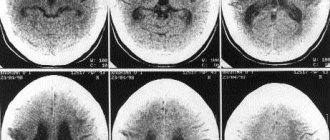Physical disability
Early signs of multiple sclerosis may fade, but sometimes patients notice changes in physical activity. This can be explained by a disruption in the passage of impulses from the muscles to the brain. First of all, it is increased fatigue. If previously it was easy to overcome the climb up the stairs or the road from home to work, then gradually this task becomes difficult to complete. Paresis develops, limiting movements, and over time the ability to train muscles, which is necessary to maintain motor activity, is lost. The progression of paresis and paralysis is the reason leading to the need to use assistive devices. Impaired motor activity leads to early wear and tear of the spinal joints, which only worsens the situation. In order to move, people with MS have to exert more effort even for basic movements. The overall situation is complicated by side effects associated with taking drugs for multiple sclerosis.
Mental changes
In this matter, not everything is so clear. In only a quarter of patients, mental changes are directly related to MS. In other cases, depression and frequent mood swings are associated only with awareness of the disease and possible prognosis, its complex course and treatment. Despite all treatment efforts, it is impossible to cure MS; it is only possible to curb its progression. A few days before an exacerbation, patients note increased irritability and mood swings. In the later stages of the disease, problems with concentration and difficulties with writing and counting are possible. In rare cases, personality changes and dementia may occur.
Infectious complications
Restricted mobility is a predisposing factor for infectious complications. Typical complications include:
- urinary tract infections, which can be explained by incomplete emptying of the bladder;
- pneumonia, due to congestion and impaired ventilation of the lungs, accumulated mucus can become a breeding ground for the development of bacteria;
- the formation of bedsores - ulcers on the skin that become infected, and in severe cases can cause sepsis.
Does MS give you a disability?
MS is often disabling, but group identification can be difficult due to the large number and variety of symptoms. Even the same clinical form can occur differently. Therefore, the group is established on the basis of motor activity disorders:
- Group I is indicated for pronounced movement disorders;
- Group II is given for severe disorders of the motor system;
- Group III is given when a person remains able to work and has mild or moderate movement disorders.
The timing of the transition to disability varies: in some patients, motor impairments appear in the first years after the onset of the disease, in others much later. There are cases where disability was assigned decades or more later.
Prevention
There is still no consensus on what exactly leads to the development of multiple sclerosis, but predisposing factors have been identified. And just their elimination is a means of prevention if there is an existing predisposition. These recommendations should also be followed when the first signs of multiple sclerosis appear:
- Lifestyle
This is a key factor in helping prevent the development of MS. First of all, this is ensuring sufficient physical activity, the main thing is that it is constant, but you should not abuse training. It is important to give up bad habits, avoid stress and emotional stress.
- Nutrition
The diet should contain a wide variety of fruits, vegetables, and herbs. It is necessary to limit the consumption of animal fats; it is better to replace them with dishes high in Omega-3 acids, that is, vegetable oils and fatty fish. It is necessary to exclude sweets, spicy, smoked, fatty cheeses, as well as red meat from the diet.
- Prevention of infectious diseases
Infections of any type, even ordinary acute respiratory viral infections, are a signal that activates the immune system, and its excessive activity affects the myelin sheath of the nerves. Accordingly, preventing infections will help avoid complications and rapid progression of the disease. Prognosis MS is a disease that constantly progresses, but the rate of its development varies greatly.
Forecast
The disease depends on many factors: lifestyle, timely diagnosis and treatment initiated.
However, the acute form of MS, which affects one in four patients, can shorten life expectancy by 4-6 years. However, this is the exception rather than the rule. And if you follow the doctor’s recommendations and properly selected therapy, life expectancy does not decrease. And if the diagnosis was made to a person at the age of 35-40, there is every chance of living fully and actively until 70 years old, or even more. Text: Yulia Lapushkina.
Multiple sclerosis in women
Multiple sclerosis (MS) is an autoimmune disease that affects the central nervous system. In MS, the immune system destroys the myelin sheath, the “insulating material” for our nerve fibers. Without enough myelin protein, the nervous system has difficulty transmitting and receiving signals properly.
The disease is characterized by a wide range of unpredictable physical, mental and emotional symptoms that vary from person to person.
According to the National Multiple Sclerosis Society, women are diagnosed with MS 3 times more often than men [1]. Although men and women often experience similar symptoms, certain factors such as menstruation, pregnancy, and menopause can influence MS symptoms in women [2, 3]. All this is due to a different hormonal background in a woman’s body and hormonal changes throughout life. MS can also affect a woman's sexual health and bladder function in different ways.
Some symptoms of multiple sclerosis in both men and women include [4-7]:
- Vision problems. Visual disturbances are often the first noticeable symptom of MS: blurred vision, poor color or contrast vision, painful eye movements, partial blindness, or dark spots in the visual field. Such problems occur due to inflammation of the optic nerves or damage to the nerve pathways that control visual function and eye movements.
- Numbness in the face, body, limbs. It can range from barely noticeable to severe, interfering with daily activities. Most periods of numbness resolve without the use of medication.
- Many MS patients experience fatigue or exhaustion. Sometimes the causes of fatigue lie in other symptoms of MS. For example, people with bladder dysfunction may have difficulty sleeping because they have to wake up regularly during the night. Sometimes fatigue occurs during the daytime.
- Bladder problems affect a large number of MS patients. These problems occur when nerve signals to the bladder and sphincters are disrupted. This can lead to more frequent urination during the day and at night, urinary incontinence, or an inability to empty the bladder.
- Muscle spasms, muscle stiffness, especially in the legs, and pain.
- Dizziness, lethargy. Nausea and vomiting associated with dizziness may also occur.
- Sexual difficulties.
- Emotional disturbances.
However, a number of studies suggest that multiple sclerosis in women may manifest itself slightly differently due to hormonal changes. Thus, women may experience more intense symptoms some time before the onset of menstruation [9]. Pregnancy, on the contrary, may reduce the risk of exacerbation of MS symptoms [10]. There is no evidence that multiple sclerosis leads to an increase in miscarriages, stillbirths, or birth defects [10].
Experts believe that pregnancy has a protective effect against MS by increasing levels of compounds that reduce inflammation in the body. However, in the first few months after birth, symptoms of multiple sclerosis tend to recur [10]. Don't forget that pregnancy also puts physical stress on the body, which can still make some MS symptoms worse. Additionally, some MS medications are not safe to take during pregnancy. Therefore, when planning a pregnancy, it is necessary to consult with your doctor.
Symptoms of multiple sclerosis may worsen after menopause, possibly due to decreased levels of estrogen, the main sex hormone in women [11]. However, it is difficult to say for sure whether MS symptoms worsen due to menopause or as a result of natural aging and subsequent disease progression.
So, although multiple sclerosis tends to affect women more often than men, the disease typically has similar symptoms. However, due to natural hormonal changes, women may experience changes in their condition.
COVID-19 (new coronavirus infection, SARS-CoV-2) is a respiratory infection characterized by high contagiousness and frequent development of complications. The emergence of COVID-19 has posed challenges for healthcare professionals related to rapid diagnosis and provision of medical care to patients. Currently, intensive study of the clinical and epidemiological features of the disease and the development of new means of its prevention and treatment continue. The most common clinical manifestation of the new variant of coronavirus infection is bilateral pneumonia (viral diffuse alveolar damage with microangiopathy); the development of acute respiratory distress syndrome (ARDS) has been reported in 3-4% of patients. Some patients develop hypercoagulation syndrome with thrombosis and thromboembolism; other organs and systems are also affected (central nervous system, myocardium, kidneys, liver, gastrointestinal tract, endocrine and immune systems), and possible development of sepsis and septic shock. Due to its high contagiousness, the new coronavirus infection caused by SARS-CoV-2 is included in the list of diseases that pose a danger to others (Resolution of the Government of the Russian Federation of January 31, 2021 No. 66).
It is important to understand that anyone can be infected with SARS-CoV-2. However, population groups have already been identified that have a higher risk of infection and especially the risk of developing severe forms of the infectious process. It is important to emphasize that patients with multiple sclerosis (MS) in general are not currently considered at risk for developing severe forms of COVID-19. At the same time, a connection was noted between the development of more severe forms of infectious disease in patients with MS with increasing age of the patient, the presence of more severe disability, the progressive course of MS, comorbid conditions such as diseases of the cardiovascular system, chronic lung diseases, diabetes mellitus, hypertension, diseases kidney, obesity. The effect of various drugs that modify the course of multiple sclerosis (DMT) on the severity of COVID-19 in patients with MS is currently assessed controversially, which requires further monitoring of patients, especially those receiving DMT with an immunosuppressive effect (alemtuzumab, ocrelizumab, cladribine tablets) .
Methodological recommendations of the Ministry of Health of the Russian Federation for preventing the spread of COVID-19 include non-specific measures (compliance with the self-isolation regime, maintaining a distance of 1.5 to 2 m, personal hygiene rules, etc.) and specific prevention through vaccination. Since January 18, 2021, mass vaccination of the population against COVID-19 has been carried out in the Russian Federation. The development of vaccines against coronavirus infection and the start of mass vaccination, in addition to hopes of ending the pandemic, have raised a lot of questions among patients regarding the safety of using vaccines for various chronic conditions.
There are several types of COVID-19 vaccines used around the world, and the list of approved vaccines is updated regularly. As of March 2021, 13 vaccines have been approved by at least one national regulator: 2 RNA vaccines (Pfizer-BioNTech vaccine and Moderna vaccine), 4 conventional inactivated vaccines (BBIBP-CorV, CoronaVac, Covaxin and CoviVac), 4 vector vaccines (Sputnik V, Oxford-AstraZaneca vaccine, Convidicea, and Johnson & Johnson vaccine), 2 peptide vaccines (EpivacCorona and RBD-Dimer).
Currently, 3 vaccines against COVID-19 are registered in Russia: “Gam-COVID-Vac” or “Sputnik V” (N.F. Gamaleya Center), “EpiVacCorona” ( ) and “CoviVac” (M Center .P. Chumakova).
Although current evidence demonstrates that having MS does not make a patient more likely to develop COVID-19, become severely ill, or die from COVID-19 compared with the general population, the risks of COVID-19 disease outweigh any potential risks associated with the vaccine itself, expert communities around the world recommend that MS patients and their families get vaccinated as soon as possible to ensure the highest level of protection against COVID-19. Published scientific evidence suggests that COVID-19 vaccines are safe and effective. None of these vaccines are live or attenuated vaccines and therefore are not capable of causing infection and can be used in patients with MS, including those receiving immunosuppressive DMTs. It is unlikely that these types of vaccines will cause a worsening of MS or worsen existing MS symptoms. To date, there has been no published evidence that people with MS are at higher risk of complications from such vaccines compared to the general population. There is no available information on how many MS patients participated in clinical trials of SARS-CoV-2 vaccines, so data on the safety and effectiveness of COVID-19 vaccines specifically for MS patients is currently lacking.
The following recommendations for vaccination of patients with MS against COVID-19 were developed by practicing neurologists specializing in the field of demyelinating diseases of the central nervous system and experts in the field of clinical research. They are based on analyzed data on how coronavirus infection occurs in the setting of MS, data from the general population of participants in clinical trials of COVID-19 vaccines and data from studies of other vaccines administered to patients with MS, as well as an understanding of the effects of DMTs on the ability of patients with MS to develop immune response. response during vaccination against the SARS-CoV-2 virus. As new data becomes available about COVID-19 and the effectiveness and safety of SARS-CoV-2 vaccination, these recommendations may be updated.
It is difficult for doctors and people with multiple sclerosis to make decisions about vaccination, especially in the context of continuing, prescribing or changing DMT therapy when available information is still limited. The decision to vaccinate should be made jointly by the patient and the attending physician based on a careful benefit/risk assessment. Any vaccine must be administered in accordance with the approved/permitted instructions for its use and the official guidelines for immunization on the territory of the Russian Federation.
Treatment with certain DMARDs may affect the effectiveness of the COVID-19 vaccine because some drugs alter the immune response, including the development of selective immunosuppression as an expected effect of therapy. Therefore, the decision about when to vaccinate against COVID-19 should include an assessment of the risk of developing COVID-19 and the patient's current condition. During an exacerbation and for 30 days after it, vaccination should not be carried out.
Most DMTs do not affect the formation of the immune response and vaccination against COVID-19 can be carried out at any time. However, even a reduced immune response may provide some degree of protection, so therapy should not be interrupted or delayed for the sake of vaccination. If possible, the optimal timing of vaccination should be selected depending on the nature of DMT therapy (Table 1).
Table 1. Recommendations for COVID-19 vaccination in patients with MS depending on DMT therapy
| PITRS | Vaccination before starting DMT therapy | Vaccination during DMT therapy |
| Interferon beta-1a, Peg-interferon beta-1a, interferon beta-1b, glatiramer acetate, teriflunomide, dimethyl fumarate | Starting therapy is possible at any time. Therapy does not affect the effectiveness of vaccination. | Continue therapy without changing the dosage regimen. |
| Fingolimod | Therapy can begin no earlier than 4 weeks after the last dose of the vaccine. | Temporarily suspending therapy for the period of vaccination is not recommended. It should be taken into account that the immune response to the vaccine may be reduced. |
| Siponimod | Therapy can begin no earlier than 4 weeks after the last dose of the vaccine. | Temporarily suspending therapy for the period of vaccination is not recommended. It should be taken into account that the immune response to the vaccine may be reduced. |
| Natalizumab | Starting therapy is possible at any time. Therapy does not affect the effectiveness of vaccination. | Continue therapy without changing the dosage regimen. |
| Ocrelizumab Rituximab* | Therapy can begin no earlier than 4 weeks after the last dose of the vaccine. | The first dose of vaccine is recommended 12 weeks after the last ocrelizumab infusion. It should be taken into account that the immune response to the vaccine may be reduced. The next infusion of ocrelizumab is possible no earlier than 4 weeks after the last dose of the vaccine. |
| Alemtuzumab | Therapy can begin no earlier than 4 weeks after the last dose of the vaccine. | Vaccination should be carried out 6 months or more after the treatment course of alemtuzumab. It should be taken into account that the immune response to the vaccine may be reduced. The next course of alemtuzumab can begin no earlier than 4 weeks after the last dose of the vaccine. |
| Cladribine tablets | Therapy can begin no earlier than 4 weeks after the last dose of the vaccine. | The vaccine can be administered at any time after a course of cladribine. It should be taken into account that the immune response to the vaccine may be reduced. The next course of cladribine should be administered no earlier than 4 weeks after the last dose of the vaccine. |
* Use of the drug “outside the instructions”
Conclusion:
- COVID-19 infection and its complications may have long-term negative effects on the overall health and neurological function of patients with MS.
- Vaccination against COVID-19 infection is extremely important both from the point of view of the health of MS patients themselves and the provision of population preventive measures.
- All currently approved COVID-19 vaccines have no contraindications for their use in MS and should be prescribed according to their instructions for use.
- Before vaccination against COVID-19, it is advisable for patients with MS to obtain recommendations from the treating neurologist regarding possible changes in therapy, including compliance with the timing of initiation, dosing and change of DMTs.
Mechanism of disease development
MS is a common disease, with more than 2 million people diagnosed worldwide. The mechanism for the appearance of signs of multiple sclerosis comes down to damage to the myelin sheath and its destruction. And the main damaging factor is one’s own immune system, which mistakenly perceives the shell as an “enemy” and tries to destroy it. This fact already affects the distortion of the transmission of nerve impulses. But the body is a system capable of self-healing, but not always everything goes smoothly. At the site of damage, plaques form that disrupt the integrity of the myelin, myelin is replaced by connective tissue, and this further disrupts the transmission of impulses and makes this process almost impossible. Over time, the disease progresses, more and more areas of the myelin sheath are replaced by connective tissue, and the symptoms become severe and pronounced.
Who is at risk?
The diagnosis is most often made in young, able-bodied people aged 20-45 years, although this pathology can also appear in people of other ages. It is women who are at risk; in this category of patients the diagnosis is made 3 times more often. This prevalence in women suggests that hormonal changes occurring in the female body play a role in the mechanism of the disease. And they influence the state of immunity and can become a trigger for the development of pathology. However, there is no reliable scientific data on this matter. Most often, multiple sclerosis manifests itself at the age of 20-30 (up to 40) years, and this age is favorable for conception and birth of a child. Therefore, if MS manifests itself before conception, women need to carefully approach the issue of family planning. The disease itself is not associated with any serious problems for pregnancy; only the treatment of multiple sclerosis and medications can pose a threat. During pregnancy, the symptoms subside, which can be explained by a decrease in the activity of the immune system. Nevertheless, cases have been reported when pregnancy led to a sharp deterioration in the condition, which may be associated with nervous experiences and emotional stress of the expectant mother.
Men are less susceptible to the disease, but the course is severe and the development is rapid.
Features of multiple sclerosis
depending on age In old age, MS symptoms develop and appear gradually, and remission is usually absent. The risk of developing the disease after 50 years of age is significantly reduced. Advanced diagnostic capabilities have led to the conclusion that MS occurs in children and adolescents. In this case, the mechanism remains the same: the body’s own immune system attacks the myelin sheath, and the passage of the nerve impulse is reduced. In childhood, MS is acute; children and adolescents complain of increased fatigue, which does not depend on the physical and mental stress that the child experiences.
Symptoms
Multiple sclerosis is a chameleon disease; symptoms depend on where the myelin sheath is destroyed. The symptomatic picture of MS includes more than fifty signs and symptoms. Early signs of multiple sclerosis often go unnoticed, since the function of the affected nerves can be taken over by healthy ones. But as soon as a significant part of the nerve endings is affected, the following symptoms appear:
- visual impairment;
- numbness of fingers;
- decreased tactile sensitivity;
- muscle weakness;
- problems with coordination.
These symptoms only progress over time and new ones appear. Some of them can be serious: muscle spasms, problems urinating, cranial nerve palsy. Behavioral disturbances also become noticeable, which can be explained not only by pathological changes, but also by the patient’s own awareness of their prospects.
Manifestation of the disease in adults
At the age of 30-40 years, symptoms may not appear for a long time, but early signs include: the appearance of weakness in the legs, numbness, visual disturbances, frequent dizziness, and during these attacks nausea, even vomiting, is possible. Another characteristic sign is emotional instability. However, the above signs are not classic. After all, the clinical picture depends on the area where the lesion occurred.
Features of pathology in men and women
The clinical symptoms of MS in men and women are practically the same. However, specific hormonal changes that occur in women affect the intensity of symptoms and the severity of the disease. A few days before the onset of menstruation, symptoms of the disease may be more pronounced. During pregnancy, the condition improves noticeably, but after childbirth, during the first months, existing symptoms may actively develop, and new ones may appear. More than 80% of men diagnosed with MS suffer from problems in the sexual sphere, which primarily manifests itself as erectile dysfunction. Problems with urination appear slightly less often: retention, incontinence, etc.
MS in the elderly and children
The clinical picture in old age has its own characteristics - painful sensations appear.
But as a rule, they manifest themselves in the form of a burning sensation, tingling, which is combined with impaired sensitivity in various parts of the body and impaired coordination. Black spots may appear before the eyes, decreased light perception, and double vision. In children, the clinical picture does not differ from that in adults. However, the severity of symptoms in children is higher. Dizziness, convulsions, etc. are typical. Young children often exhibit general cerebral symptoms, including coma and lethargy. However, such an abrupt onset of the disease is not a sign of an unfavorable outcome in the future. Text: Yulia Lapushkina.










